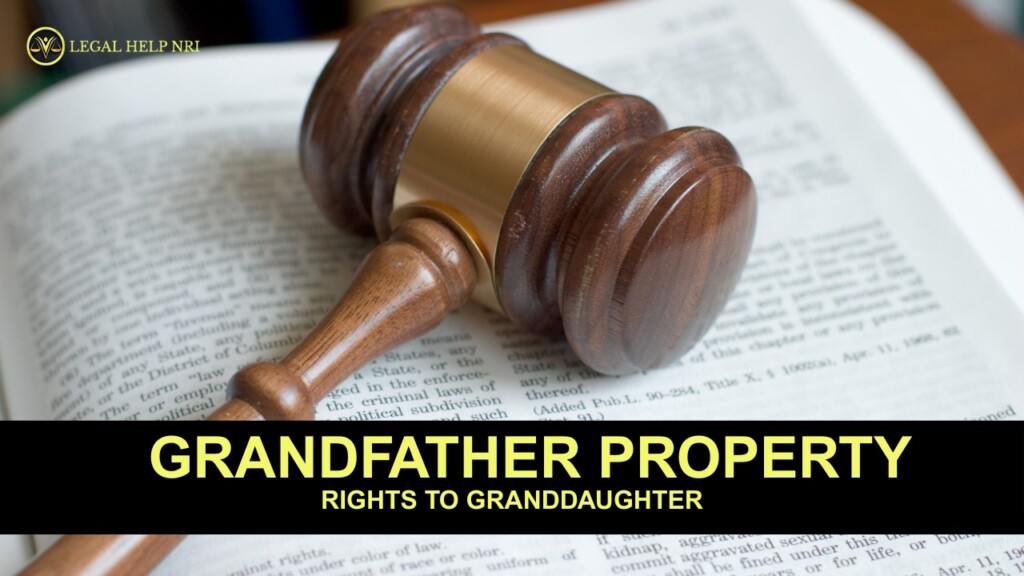Property disputes in families are not uncommon in India, especially when it comes to the inheritance of ancestral wealth. One topic that often leads to confusion is the married granddaughter’s rights on grandfather’s property. As women in India become more aware of their legal rights, questions about inheritance and succession are gaining importance.

This blog provides a comprehensive and easy-to-understand explanation of the rights of granddaughter in grandfather’s property, including her rights after marriage, the difference between ancestral and self-acquired property, and the impact of wills.
Inheritance Laws in India: An Overview
India does not have a uniform civil code, which means inheritance laws vary based on religion. The rights of granddaughters in a grandfather’s property fall under the Hindu Succession Act, 1956, if they are Hindus (including Sikhs, Jains, and Buddhists).
This law governs both intestate succession (when a person dies without a will) and testamentary succession (when a person dies leaving a valid will).
Types of Property: Ancestral vs. Self-Acquired
1. Ancestral Property
- Passed down for four generations without division
- Includes property inherited from father, grandfather, great-grandfather
- Part of a Hindu Undivided Family (HUF)
- All coparceners, including daughters, have birthright over it
2. Self-Acquired Property
- Earned, bought, or gifted using grandfather’s own income
- He can sell, gift, or will it freely
- Legal claim arises only if he dies intestate (without a will)
Also Read: DISPUTES OF BUYERS WITH BUILDERS
Married Granddaughter Rights on Grandfather Property: Key Scenarios
Case 1: If the Property is Ancestral
Yes, a married granddaughter has rights on grandfather’s ancestral property. According to the Hindu Succession Act:
- Daughters are coparceners by birth (post-2005 amendment)
- If the granddaughter’s parent (son or daughter of grandfather) has died, she inherits their share
- Marriage does not affect these rights
Example: If a grandfather has ancestral property and his son (granddaughter’s father) dies, the granddaughter inherits the father’s share—even if she is married.
Case 2: If the Property is Self-Acquired
The rules differ here:
- Grandfather can will the property to anyone
- If no will, married granddaughter may inherit if her parent is deceased
- This applies only in cases of intestate death
Impact of Marriage on Granddaughter’s Rights
There’s a misconception that marriage ends a girl’s inheritance rights. Legally, that’s incorrect.
- Marriage does not remove inheritance rights
- A married granddaughter has equal legal status under the law
Role of Will in Inheritance
If the grandfather leaves a will:
- Property distribution follows the will
- Married granddaughter can only claim if included
- She may challenge the will if fraud or coercion is proven
Legal Heirs Under Hindu Succession Act
When a Hindu male dies intestate, the following are Class I heirs:
- Son
- Daughter
- Widow
- Mother
- Grandchildren (if their parent is deceased)
A married granddaughter becomes a Class I heir if her father or mother (the son/daughter of the grandfather) is not alive.
Landmark Supreme Court Judgment (2020)
“A daughter shall remain a coparcener throughout life, irrespective of whether the father is alive or not.”
This judgment strengthened the rights of women and recognized their inheritance rights even after marriage.
Documents Required to Claim Grandfather’s Property
- Grandfather’s death certificate
- Legal heir certificate
- Property documents
- Proof of family relationship
- Proof of deceased parent (if applicable)
Conclusion: Where Does the Law Stand?
- ✅ A married granddaughter has rights in ancestral property
- ✅ She can claim self-acquired property if her parent is deceased and no will exists
- ✅ Marriage does not cancel inheritance rights
- ✅ A will can override rights in self-acquired property
FAQs: Grandfather Property Rights to Granddaughter
Q1. Does a married granddaughter have rights on ancestral property?
Yes. She can inherit through her deceased father or mother’s share.
Q2. Can a granddaughter claim property if her father is alive?
No. Her father is the direct legal heir. She can claim after his death.
Q3. Can a granddaughter be excluded through a will?
Yes, but only from self-acquired property—not ancestral property.
Q4. What if the granddaughter is adopted?
Adopted granddaughters have the same legal rights under the Hindu Succession Act.
If you’re unsure about your inheritance rights, consult a family law expert. The law supports equal property rights for women — including married granddaughters.
Also Read: POWER OF ATTORNEY AND ITS EFFECTS
